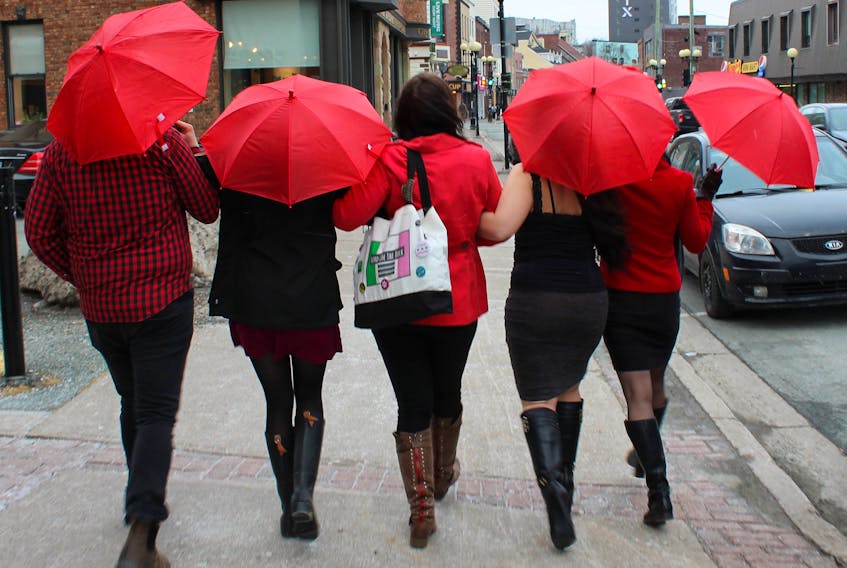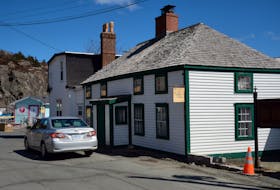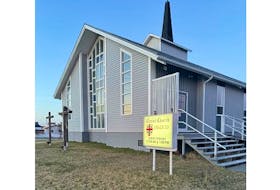Street voices: part 2 of 3
Sex workers in St. John’s are crying out for regulation.
The Long’s Hill area of town is where a lot of street-based sex work occurs, but the majority of sex work takes place within workers’ homes or at permitted adult massage parlours around the city.
Rachel, a sex worker who asked to be given a pseudonym, says work indoors is safer than outdoors because of the safety measures sex workers put in place for their own protection.
Related podcast: Listen to senior reporter Barb Sweet talk to David Maher about this series.
She says most often it’s the customers who cause disturbances in the Long’s Hill area, not the sex workers.
“Residents are having a problem with street-based sex work. I work indoors. If the women who are working on Long’s Hill were working indoors, that would get rid of all of the customers that are causing problems in the neighbourhood,” she said.
The problem is that those who work on the street frequently have nowhere else to turn. It has to do with mental health and addictions issues that sex workers face, along with the relatively small number of massage parlours that exist for women to work from.
“They don’t have a lot of choices. Right now, the studios that do exist have a lot of very strict rules about gentlemen coming around that aren’t clients and drug and alcohol abuse — you can’t give consent if you’re under the influence,” Rachel said.
“They’re forced into that area because there’s nowhere else to go. We’ve all found the root of the problem, but we’re not doing anything about it. We’re kicking sex workers when they’re down, and that’s not fair.”
In 2015, a moratorium was put in place by the City of St. John’s preventing the issuance of more permits for adult massage parlours. A former massage parlour on Wood Street was the focal point of area complaints, so the city put the moratorium in place as a safety measure for residents.
Workers say that because the permits are tied to addresses, rather than to the businesses, it prevents them from leaving neighbourhoods where issues arise. They want to see the moratorium lifted to give sex workers space to work and also give them the chance to leave neighbourhoods where they’re not welcome.
“Give the women a place to work that is safe. That is all we’re asking for,” Rachel said.
Alice, the manager of a massage parlour in town who also asked for a pseudonym, says part of the concern from residents and police regarding sex work is the risk of exploitation. She says sexual exploitation is a very real issue in the city, but sex work done right is not exploitation.
“One of the misconceptions is that anyone who is in this work is being exploited. That’s not true. We recognize that there is human trafficking and people are being exploited,” she said.
“I’ve had people tell me that because I’m helping to manage a massage parlour that I’m actually pimping women. That is not true. I don’t make money off of them.”
A Supreme Court decision in 2013 stated that selling sex is not illegal. What is illegal is making money off someone else’s sex work, largely due to concerns of exploitation. Because massage parlours rent space to sex workers and don’t make money off the sex work itself, they are legal.
Alice says working in a parlour allows her to do sex work safely.
“It’s all about having your own power and control. Security and autonomy are the main factors for me,” she said.
“I can turn away people if I don’t feel safe. If I were being exploited or trafficked, I wouldn’t be able to do that. I get to choose when I work and where I work and how I work.”
On top of that, Alice says sex workers often disrupt exploitative situations.
“We also want to prevent exploitation and trafficking. A lot of times, women in the industry, if we see someone who’s at risk or we see a situation that doesn’t feel right, we talk. It’s getting back to the right people and it’s being dealt with in the right ways,” she said.
“If they’re coming up young, if they’re saying their boyfriend recommended they work here, there’s going to be some clues there. Because we’ve connected with (the Safe Harbour Outreach Project) we have some tools to be able to deal with this.”
When things do escalate, the relationship between sex workers and the police can be a difficult line to walk. Royal Newfoundland Constabulary Chief of Police Joe Boland says officers have to strike a balance between meeting the needs of the community and making sure sex workers feel safe coming forward.
“It’s always going to be a sensitive relationship. We have some very dedicated, committed, sensitive, empathetic officers here that work with sex workers in our community,” Boland said. “Sometimes it’s a very difficult role for the police to play. We have residents that live in the community that want a response from the police. There’s a balance here.”
Boland says the RNC does not arrest sex workers for their work, but when other illegal activities happen, they have to act.
“The last thing we want to be doing is the enforcement side of things, especially when dealing with vulnerable people. We don’t think incarceration is the answer. The issues that exist, especially at the street level, is significant. Incarceration is not the answer,” he said.
“That said, we have a responsibility to keep the peace in communities. People have the right to enjoy their properties.”
One solution currently being rolled out by police isn’t specifically for sex workers, but has been welcomed by workers and advocates alike.
The police, in partnership with the Department of Health, are launching a mental health crisis unit. The unit would involve a van, with a plainclothes police officer and a health care professional. They would respond to mental health crisis calls and work to de-escalate the situation, without simply putting on handcuffs where they may not be appropriate.
Boland says the project has been something he’s worked toward since he first became a police officer, and he is hopeful it will help the entire community, as well as sex workers.
“I have 34 years of experience. I can go back over 34 years and tell you about calls where they were health calls that required a police response simply because there was no other response. We found ourselves going into people’s homes, taking people from their homes, they had to be handcuffed, they had to be searched, sitting in waiting areas. They weren’t criminals. They needed medical attention.”
Friday: The Long Road to Community
Twitter: DavidMaherNL









